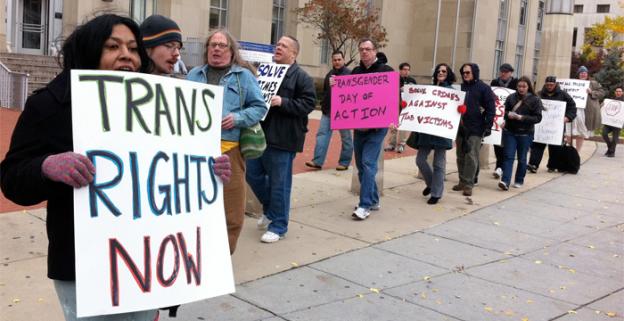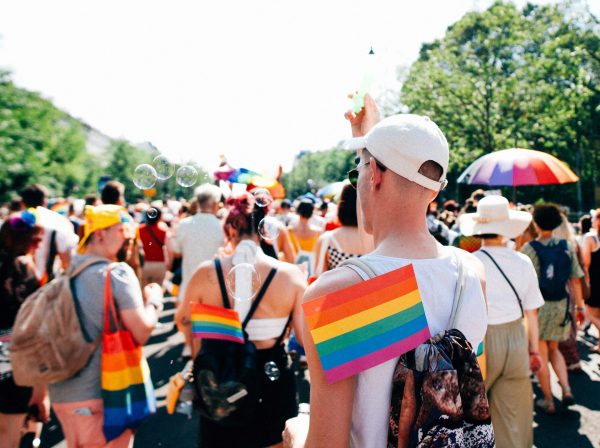This article is going to be short, sweet, and to the point. Myriad oppressive terms exist to shun and alienate marginalized people and demographics everywhere; thousands of slurs are incorporated into the everyday lexicon that they have become commonplace and disseminated. Many individuals have become desensitized to the levels of offense all slurs carry (whether they happen to be in the process of reclamation by communities specific slurs are directed at or not). One that is slowly weaseling its way into use through the dregs of Tumblr is “Transtrender.”
“Transtrender” is a play on the word “Transgender.” Transgender refers to any individual whose gender identity does not align with the sex they were assigned at birth. We trans* folk have started gaining visibility in the media (though the respectful representation of our narratives of existence remains few and far between). Our movements are bubbling to the surface, gaining momentum closer to the mainstream than ever before. Transphobia is nowhere near eradicated; it still runs rampant through dominant culture and is a staple in social justice-bashing rhetoric.
The fairly recent slur “Transtrender” refers to this recent visibility of trans* individuals and momentum our movements are picking up, albeit slowly. There is a girth of information about gender identity floating around accessible media—largely made possible by the internet. Support groups for all sorts of LGBTQIA+ people are more common, many of which are online; consciousness has been raised about recognizing LGBTQIA+ youth, and how undeniably necessary doing that is. Through the internet, we have been able to form a network of information, support for trans* people, loved ones of trans* people, and other resources of all shapes and sizes. There’s also LGBTQIA+ specific dating and hook-up sites, like Grindr. As consciousness is raised, more and more people are coming out as trans*, lots of whom identify as non-binary (that is, beyond or between “man” and “woman”). For some unfathomable reason, this wonderful blooming of young people (and adults!) discovering their identities, gender and sexuality, and others like them are seen as “trendy.” Coming out as something other than what you are perceived as is suddenly viewed by masses as a fad-like phenomenon. Unfortunately, but also undeniably (and to deny it would be extremely irresponsible), throwing about the term “Transtrender” is super duper common on certain LGBTQIA+ Tumblr pages and groups. Often, it is used by some binary trans individuals (self-dubbed “Truscum,” another recent self-identification) to discredit non-binary (a)genders.
The catch-22 here is a tough one. Due to mass media’s view of young people in general, most things that become common in younger demographics is seen as and/or depicted as a fad, a trend, a phase. Queer individuals already need to deal too much and too often with being told that we are just going through a phase, it’ll pass; we’re told that our identities, whether sexual or romantic orientation or gender identity, are invalid. The last thing we need is to be told so by our own communities, the people who are in theory supposed to support us in our journey. Sure, I can—in theory—understand how it can be viewed as a fad-like phenomenon. Out of context, this could all seem sudden, when in actuality decades of activism have led the way into visibility, momentum, and acceptance. And, importantly, decades of activism have made information available to everyone. Including young people. Especially young people. It’s wonderful that people, such as myself, who have never ever felt like they fit anywhere in society are discovering that they are not alone, or broken, or imagining it. It’s awesome that they can escape being ostracized onto Tumblr and sites like Queer Voices, find safe spaces to interact, to gather information about everything from current movements to non-western gender identities and the way non-western cultures treat gender identities (often very different than the westernization of non-binary genders).
But, because so many of these people are coming out at younger ages—ages that cis-het culture believes is far too early to understand gender and sexuality—and because it appears a sudden thing, non-binary (and binary trans) people are dismissed as chasing just another passing bandwagon.
Have you ever been called “Transtrender?” How did you respond? If you have (and if you haven’t), I’m here to tell you that you are not only are you a lovely person, you are valid in every possible way.





